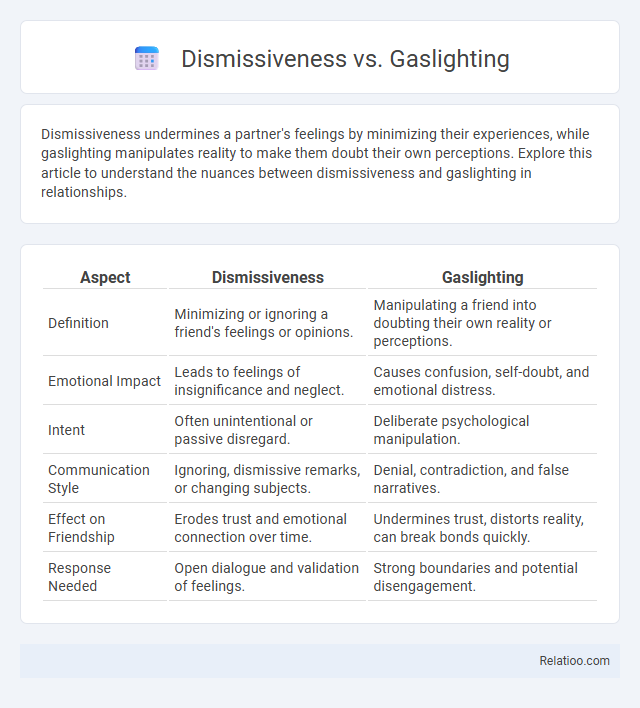Dismissiveness undermines a partner's feelings by minimizing their experiences, while gaslighting manipulates reality to make them doubt their own perceptions. Explore this article to understand the nuances between dismissiveness and gaslighting in relationships.
Table of Comparison
| Aspect | Dismissiveness | Gaslighting |
|---|---|---|
| Definition | Minimizing or ignoring a friend's feelings or opinions. | Manipulating a friend into doubting their own reality or perceptions. |
| Emotional Impact | Leads to feelings of insignificance and neglect. | Causes confusion, self-doubt, and emotional distress. |
| Intent | Often unintentional or passive disregard. | Deliberate psychological manipulation. |
| Communication Style | Ignoring, dismissive remarks, or changing subjects. | Denial, contradiction, and false narratives. |
| Effect on Friendship | Erodes trust and emotional connection over time. | Undermines trust, distorts reality, can break bonds quickly. |
| Response Needed | Open dialogue and validation of feelings. | Strong boundaries and potential disengagement. |
Understanding Dismissiveness and Gaslighting
Dismissiveness involves ignoring or minimizing someone's feelings or thoughts, often leading to emotional invalidation, while gaslighting is a manipulative tactic that distorts reality to make the victim question their own perceptions. Understanding dismissiveness requires recognizing subtle signs, such as ignoring concerns or belittling emotions, whereas gaslighting often includes deliberate lies and manipulation to control or confuse the victim. Both behaviors damage trust and communication but differ fundamentally in intent and psychological impact, with gaslighting causing deeper cognitive and emotional harm.
Key Differences Between Dismissiveness and Gaslighting
Dismissiveness involves ignoring or minimizing someone's feelings or opinions, often leading to invalidation without intentional manipulation. Gaslighting is a deliberate form of psychological abuse where the perpetrator manipulates facts to make the victim doubt their reality or memory. The key difference is that dismissiveness may be unintentional and primarily invalidates, whereas gaslighting intentionally distorts truth to control or confuse the victim.
Common Signs of Dismissive Behavior
Common signs of dismissive behavior include minimizing or ignoring others' feelings, interrupting conversations, and consistently invalidating concerns by labeling them as overreactions. This behavior often manifests through sarcastic remarks, refusing to acknowledge another person's perspective, and avoiding accountability in conflicts. Recognizing these patterns helps differentiate dismissiveness from gaslighting, where the latter involves deliberate manipulation to make someone doubt their reality.
How Gaslighting Manifests in Relationships
Gaslighting in relationships manifests through consistent denial of your reality, causing you to question your perceptions and memories. Unlike general dismissiveness, which merely ignores or downplays your feelings, gaslighting actively manipulates your sense of truth and induces self-doubt. This psychological abuse erodes trust and empowers the gaslighter to control the dynamic, leaving lasting emotional damage.
Psychological Impact of Dismissiveness
Dismissiveness in interpersonal relationships undermines an individual's feelings and experiences, leading to diminished self-esteem and increased anxiety. Unlike gaslighting, which involves manipulation to distort reality, dismissiveness simply invalidates emotions without altering perceptions. The persistent psychological impact of dismissiveness includes chronic stress, emotional withdrawal, and impaired trust in communication.
Emotional Consequences of Gaslighting
Gaslighting leads to profound emotional consequences, causing You to question your reality, experience confusion, and suffer from diminished self-esteem. Unlike dismissiveness, which merely invalidates feelings, gaslighting actively manipulates and distorts Your perception of truth, fostering anxiety, depression, and emotional dependence. Recognizing these differences is crucial to protect Your mental health and seek appropriate support.
Recognizing Patterns: When Dismissiveness Turns to Gaslighting
Recognizing patterns is crucial when dismissiveness escalates into gaslighting, as the subtle shift involves invalidating Your feelings and distorting your reality to undermine confidence. Dismissiveness typically ignores concerns, whereas gaslighting manipulates perceptions, making You question the truth of your experiences. Identifying these behaviors early helps protect Your mental health and maintain boundaries against psychological abuse.
Strategies for Responding to Dismissiveness
Strategies for responding to dismissiveness include calmly asserting your feelings and setting clear boundaries to protect your emotional well-being. You can use reflective listening techniques to ensure your perspective is acknowledged while maintaining a composed demeanor. Prioritize open communication and seek support from trusted individuals to reinforce your confidence in addressing dismissive behavior effectively.
Coping Mechanisms for Victims of Gaslighting
Victims of gaslighting often develop coping mechanisms such as setting strong personal boundaries, seeking validation from trusted sources, and documenting interactions to counteract manipulation. Unlike dismissiveness, which involves ignoring or minimizing feelings, gaslighting actively distorts reality, making it crucial for victims to reinforce their self-trust and mental clarity. Therapy and support groups provide essential tools for victims to rebuild confidence and recognize abusive patterns, aiding long-term emotional recovery.
Seeking Support and Recovery from Emotional Manipulation
Recognizing dismissiveness and gaslighting is crucial for your emotional recovery, as both involve invalidating your feelings and distorting reality. Seeking support from trusted friends or mental health professionals helps you regain clarity and validate your experiences. Building coping strategies and boundaries empowers you to heal from manipulation and restore your emotional well-being.

Infographic: Dismissiveness vs Gaslighting
 relatioo.com
relatioo.com